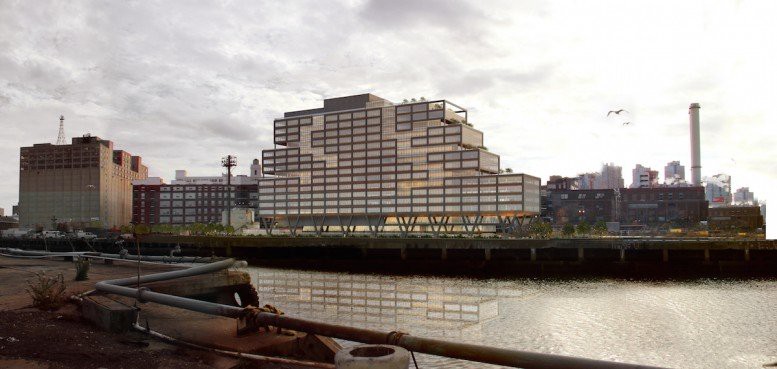WeWork in Boxes

These boxes — the only geometry in new New York City architecture right now — are mostly filled with venture capital that has been invested in WeWork, the co-working startup that was recently valued at ten billion dollars, and who will be the anchor tenant of this three-hundred-and-eighty-million-dollar development in the Brooklyn Navy Yard, occupying about a third of its six hundred and seventy-five thousand square feet of space.
It is not especially remarkable that WeWork, the fastest-growing company in New York by footprint, is acquiring another couple hundred thousand square feet of space. But until now, WeWork’s business model has been thus:
WeWork takes out a cut-rate lease on a floor or two of an office building, chops it up into smaller parcels and then charges monthly memberships to startups and small companies that want to work cheek-by-jowl with each other.
In some respects, this is firmly in the mold of so-called “sharing economy” startups: Taking existing infrastructure, parceling it out in a more efficient manner, then skimming off the capital excreted by the process.
However, WeWork is deeply involved the design and development of this new space, which CEO Adam Neumann described to Bloomberg Businessweek as “a model for WeWork developments across the country”:
We got to design this from bottom up, which means that everything about it is built to foster collaboration. There is nothing like this building built in the world today. Everything from where the elevators are located to how big is the cafeteria.
One might reasonably ask, “Other than some vague bullshit rhetoric about ‘membership’ and ‘community’ what makes WeWork something other than a real estate developer?” Good question! A non-answer, but an observation nonetheless, is WeWork’s partnerships with established mega-developers — Rudin Management, one of New York’s largest real estate dynasties, and Boston Properties, “one of the largest owners, managers, and developers of first-class office properties in the United States,” are co-developing the Navy Yard project with the company. WeWork is also in talks to take over the entire building at 110 Wall Street, which is owned by Rudin, while Mort Zuckerman, the chairman and co-founder of Boston Properties, is reportedly personally invested in the company.
If WeWork developed software instead of real estate, one might say that this is the company moving to “own the whole stack.” Or, put another way, it turns out that, when your vision isn’t distorted by optics, the sharing economy looks a whole lot like the regular economy?
Renders by S9 Architecture via NY YIMBY
